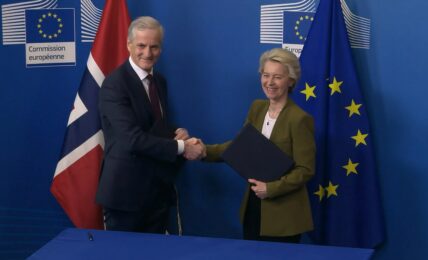Integrated container logistics company A.P. Moller – Maersk announced today a strategic partnership with US-based project developer Carbon Sink LLC to develop green methanol production facilities in the U.S., starting with a 100,000 tonne per year facility.
Maersk said that it intends to purchase the full volume of green methanol produced, with options for the output of subsequent facilities at other locations, forming part of the company’s fleet decarbonization efforts.
This is Maersk’s eighth green-methanol agreement, following the company’s recently announced several deals to source at least 730,000 tones of green methanol per year by the end of 2025.
Earlier this year, Maersk unveiled a series of carbon reduction targets, aiming to achieve net zero gas emissions in 2040 across its entire businesses and all scopes, as well as a 50% reduction in emissions per transported container in its ocean fleet, and a 70% reduction in absolute emissions from fully controlled terminals by 2030. The company has also introduced a principle of only ordering newbuilt vessels that can be operated on green fuels.
The agreements follow a series of orders by Maersk of clean-fuel-powered container ship over the past several months, including an order in July for the world’s first carbon-neutral methanol fueled container ship, followed by an order for 8 large methanol-powered ocean-going container vessels, and another order last month for six large ships. Maersk currently has 19 green container vessels on order capable of operating on green methanol.
Berit Hinnemann, Head of Green Fuels Sourcing, A.P. Moller – Maersk, said:
“Securing green fuels at scale in this decade is critical in our fleet decarbonisation efforts. We have set a 2040 net zero target for our entire business – but importantly to stay in line with the Paris Agreement, we have also set 2030 targets to ensure meaningful progress in this decade.”
Carbon Sink said it will use a commercially available technology to produce green methanol by combining green hydrogen from electrolysis of water using additional renewable electricity and biogenic CO2. The CO2 for the first project will be waste CO2 captured from the Red River Energy bioethanol plant, recycling those emissions into green methanol.
The commercial start for the project is anticipated to commence in 2027.
Steve Meyer, CEO of Carbon Sink, said:
“We are very pleased to be working with Maersk in support of their mission to decarbonise the shipping sector. Carbon Sink brings a vast wealth of knowledge, experience and partnerships to help them achieve their ambitious corporate goals. Our multi-project development strategy creates a pathway for the supply of significant volumes of green methanol to help meet the demand of Maersk’s growing dual-fuel ship fleet.”
The post Maersk Sources 100,000 Tonnes of Green Methanol to Support Fleet Decarbonization Goals appeared first on ESG Today.



